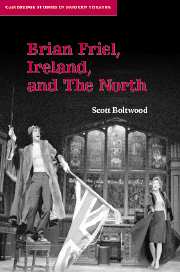Book contents
- Frontmatter
- Contents
- Acknowledgments
- List of abbreviations
- Introduction: Friel, criticism, and theory
- 1 The Irish Press essays, 1962–1963: Alien and native
- 2 The plays of the 1960s: Assessing partition’s aftermath
- 3 The plays of the 1970s: Interrogating nationalism
- 4 Plays 1980–1993: The North
- 5 Plays 1994–2005: Retreat from Ireland and The Home Place
- Notes
- Works cited
- Index
3 - The plays of the 1970s: Interrogating nationalism
Published online by Cambridge University Press: 22 September 2009
- Frontmatter
- Contents
- Acknowledgments
- List of abbreviations
- Introduction: Friel, criticism, and theory
- 1 The Irish Press essays, 1962–1963: Alien and native
- 2 The plays of the 1960s: Assessing partition’s aftermath
- 3 The plays of the 1970s: Interrogating nationalism
- 4 Plays 1980–1993: The North
- 5 Plays 1994–2005: Retreat from Ireland and The Home Place
- Notes
- Works cited
- Index
Summary
From the production of The Mundy Scheme in 1969 through that of Volunteers in 1975, three of Friel's four plays present a particularly focused critique of contemporary politicized life in Ireland. For those who view Friel's nationalism as purely cultural, this dramatization of public society may seem an uncharacteristic detour from his ostensible avoidance of such topics. While in interviews Friel admits a commitment to nationalist ideology that evolved from the passionate in 1964 to the attenuated by 1972, he eschews any direct relationship to political nationalism; his interest in politics as been relegated to, and all but forgotten in, his Irish Press articles. One of his first columns recounts his frustrating day volunteering for Eddie McAteer's reelection campaign in 1962 (9 June 1962), but more revealing are his later incidental admissions of his fantasies of a more direct political involvement. In his “New Year's Diary” of 1963 he dreams of assuming the chairmanship of the “Orange and Green talks” (5 January 1963), while the following week he fantasizes that he is another Charles Stewart Parnell demanding the union of the island (12 January 1963). Later in 1963 he ruminates on Lord Brookeborough's ouster from the Stormont premiership and feels its immediacy even on the streets of New York City (11 May 1963). In short, these essays reveal a political engagement complementing his commitment to cultural nationalism.
- Type
- Chapter
- Information
- Brian Friel, Ireland, and The North , pp. 78 - 138Publisher: Cambridge University PressPrint publication year: 2007



